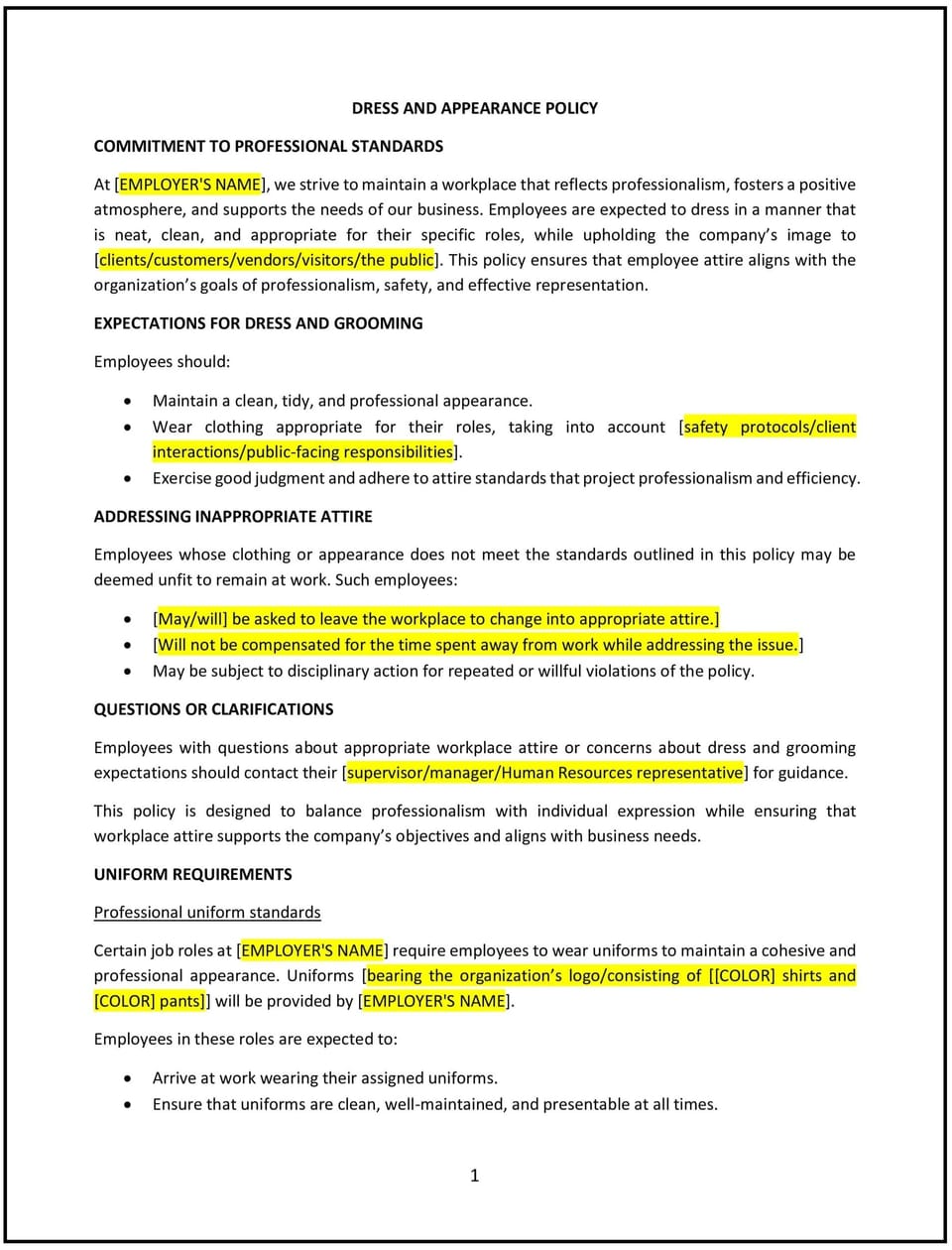Dress and appearance policy (Georgia): Free template

Dress and appearance policy (Georgia)
This dress and appearance policy is designed to help Georgia businesses establish clear expectations for employee attire and personal appearance in the workplace. The policy outlines appropriate dress standards, grooming expectations, and guidelines for specific roles or occasions while accommodating personal and cultural expression.
By implementing this policy, businesses can promote a professional image, ensure workplace safety, and foster inclusivity.
How to use this dress and appearance policy (Georgia)
- Define dress standards: Specify general expectations for workplace attire, such as business formal, business casual, or uniform requirements, tailored to the industry and role.
- Address safety requirements: Outline clothing or accessories necessary for safety, such as closed-toe shoes or protective gear, particularly in roles involving physical labor or hazardous environments.
- Accommodate cultural and religious expression: Include provisions for clothing or grooming practices based on personal, cultural, or religious beliefs, as long as they do not interfere with workplace safety or performance.
- Include grooming expectations: Specify grooming standards where relevant, such as neatness or hygiene, ensuring they are applied fairly and without bias.
- Tailor guidelines to roles: Differentiate dress expectations for customer-facing, office-based, and field roles, as needed, to align with workplace functions.
- Provide flexibility for events: Outline relaxed dress codes for casual Fridays, company events, or remote work, if applicable.
- Communicate policy updates: Share any changes or updates to the policy with employees promptly to avoid confusion or noncompliance.
- Review and update regularly: Periodically review the policy to ensure it reflects current business needs, cultural trends, and Georgia-specific considerations.
Benefits of using this dress and appearance policy (Georgia)
Implementing this policy provides several advantages for Georgia businesses:
- Promotes professionalism: Clear guidelines help employees maintain a professional image that reflects positively on the company.
- Enhances safety: Tailored dress codes address workplace-specific safety needs and minimize risks.
- Supports inclusivity: Accommodations for personal and cultural expression create a respectful and welcoming environment.
- Reduces ambiguity: Defined standards eliminate confusion about acceptable attire and grooming practices.
- Reflects Georgia-specific values: Tailoring the policy to local customs and expectations ensures it resonates with employees and clients.
Tips for using this dress and appearance policy (Georgia)
- Communicate expectations: Share the policy during onboarding and ensure employees understand the dress standards for their roles.
- Be consistent: Apply the policy uniformly across all employees to maintain fairness and prevent perceived favoritism.
- Encourage feedback: Invite employees to share their thoughts on the policy to address any concerns and improve inclusivity.
- Provide examples: Offer visual or written examples of appropriate attire to clarify expectations for different roles or occasions.
- Monitor adherence: Address dress code violations discreetly and respectfully to maintain workplace harmony.
Q: What is considered appropriate attire under this policy?
A: Appropriate attire depends on the role and industry. For example, business casual may be required in an office setting, while uniforms may be necessary for fieldwork.
Q: Are employees allowed to wear culturally significant clothing?
A: Yes, employees may wear culturally or religiously significant clothing, provided it aligns with safety requirements and does not interfere with workplace performance.
Q: How should businesses address dress code violations?
A: Managers should address violations discreetly and respectfully, providing guidance on how to meet the dress code moving forward.
Q: Can the dress code be relaxed for specific events?
A: Yes, businesses may allow casual attire for events such as company picnics, casual Fridays, or remote work, as outlined in the policy.
Q: How does this policy address safety concerns?
A: The policy includes specific guidelines for roles requiring safety gear or protective clothing, such as closed-toe shoes or high-visibility vests.
Q: Are there different dress codes for customer-facing roles?
A: Yes, customer-facing roles may require more formal attire to maintain a professional image, while other roles may have more flexible guidelines.
Q: How often should this policy be reviewed?
A: The policy should be reviewed annually or whenever there are significant changes in workplace needs, cultural norms, or Georgia regulations.
This article contains general legal information and does not contain legal advice. Cobrief is not a law firm or a substitute for an attorney or law firm. The law is complex and changes often. For legal advice, please ask a lawyer.


